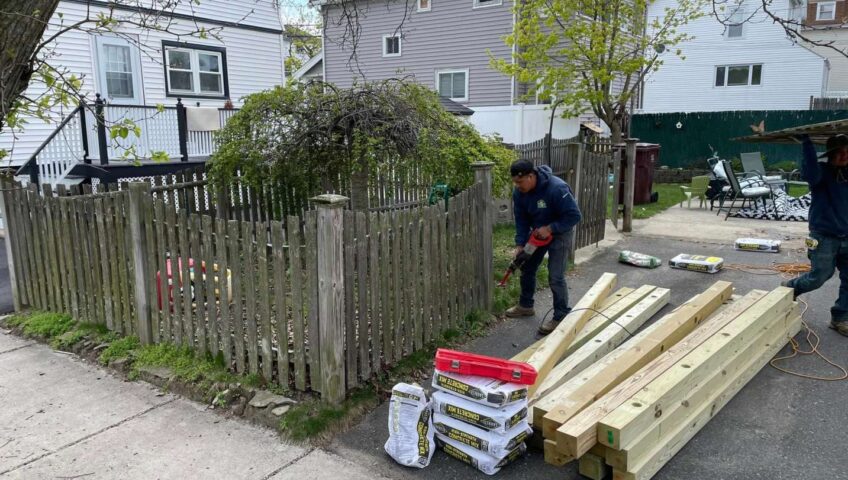When it comes to securing your property, choosing the right fence material is essential. A fence not only adds a touch of aesthetic appeal to your property but also provides security and privacy. However, with so many options available, it can be overwhelming to decide which fence material is best for your needs. In this article, we will explore the pros and cons of different fence materials to help you make an informed decision. Whether you’re looking for a wood fencing company in Massachusetts or a reliable chain link fence installer, this guide will provide valuable insights.
Pros and Cons of Different Fence Materials:
I) Wood Fences: The Classic Choice
Wood fences have been a popular choice for centuries due to their timeless beauty and natural appeal. We offer a traditional and rustic look that complements various architectural styles. If you’re considering a wood fencing company in Massachusetts, here are some advantages and disadvantages to keep in mind.
Advantages of Wood Fences:
1. Natural aesthetic appeal: Wood fences have a timeless beauty that blends well with various architectural styles. They provide a warm, rustic charm that can instantly elevate the overall appearance of your property.
2. Versatility in design and customization: Wood fences offer endless design possibilities. Whether you prefer a traditional picket fence or a modern horizontal slat design, wood can be easily customized to match your preferences. Additionally, wood can be stained or painted in different colors to complement your home’s exterior.
3. Cost-effective option: Wood fences are generally more affordable compared to other materials like wrought iron or aluminum. If you’re on a budget, wood can be an excellent choice without compromising on quality and durability.
Disadvantages of Wood Fences:
However, wood fences also have their drawbacks:
1. Maintenance requirements: Wood fences require regular maintenance to keep them in good condition. This includes periodic staining or painting to protect the wood from moisture and UV damage. Additionally, you’ll need to inspect for any signs of rot or pest infestation and address them promptly.
2. Susceptibility to rot, pests, and weather damage: Wood is vulnerable to rot, especially when exposed to moisture for prolonged periods. It can also be susceptible to insect infestations, such as termites. Moreover, harsh weather conditions like heavy rain or extreme heat can cause the wood to warp or crack over time.
II) Vinyl Fences: Durability and Low Maintenance
Vinyl fences have gained popularity in recent years due to their durability and low maintenance requirements. If you’re seeking a durable and low-maintenance fencing option, vinyl fences are worth considering. Vinyl has gained popularity in recent years due to its durability and longevity. Here are some advantages of choosing vinyl fences:
Advantages of Vinyl Fences:
1. Durability: Vinyl fences are incredibly durable and can withstand harsh weather conditions, including heavy rain, snow, and UV rays. Unlike wood, they don’t warp, rot, or crack easily, making them a long-lasting option for your property.
2. Low maintenance: One of the significant advantages of vinyl fences is their low maintenance requirements. Unlike wood, they don’t need staining, painting, or sealing. A simple occasional cleaning with soap and water is usually enough to keep them looking pristine.
3. Variety of styles: Vinyl fences are available in a wide range of styles and colors, allowing you to choose the perfect option that complements your property’s aesthetics. From traditional white picket fences to contemporary privacy fences, there is a vinyl design for every taste.
Disadvantages of Vinyl Fences:
While vinyl fences offer many benefits, there are a few considerations to keep in mind:
1. Limited design options: Vinyl fences may not offer as much design versatility as wood. They typically come in pre-made panels and have limited color options. However, advancements in manufacturing have led to a wider variety of styles and colors becoming available.
2. Higher initial cost: Vinyl fences tend to have a higher upfront cost compared to wood. However, considering their durability and low maintenance requirements, they can be a cost-effective choice in the long run.
Conclusion
Choosing the right fence material for your property requires careful consideration of various factors. Wood fences offer a classic and versatile option with natural aesthetic appeal, but they require regular maintenance and may be susceptible to rot and weather damage. On the other hand, vinyl fences provide durability and low maintenance, although they may have limited design options and a higher upfront cost. Assess your priorities, budget, and long-term goals to make an informed decision that meets your specific requirements.
Whether you’re looking for a wood fencing company in Massachusetts or a reliable chain link fence installer, it’s essential to choose a reputable and experienced professional. We can guide you through the selection process, ensuring you get the perfect one.
